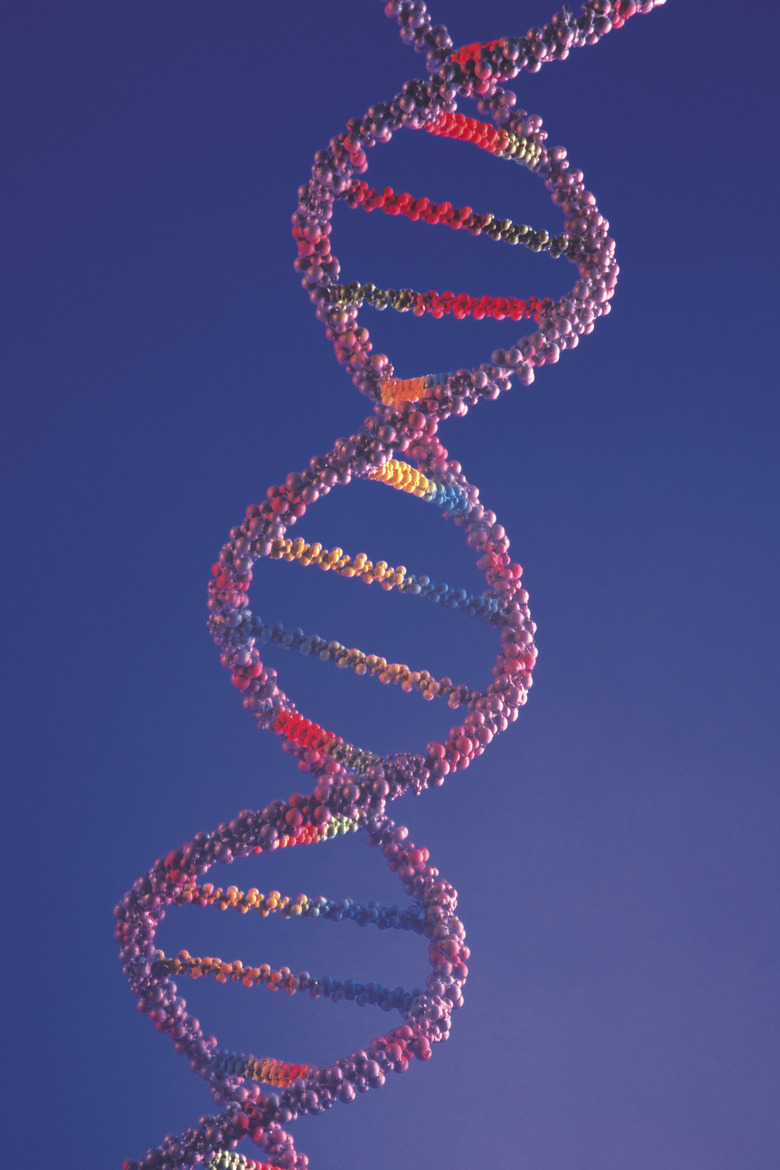Why Are There 61 Anticodons?
Anticodons are groups of nucleotides that play a crucial role in formation of proteins from genes. There are 61 anticodons that code for protein formation, even though there are 64 possible combinations of anticodons. The additional three anticodons are involved with termination of protein formation. Genetic mutations occurring within the anticodons can cause severe changes to proteins made from genes, leading to diseases such as cancer.
Nucleotides
Nucleotides
Nucleotides are the building blocks of genetic material. DNA and RNA are composed of numerous nucleotides bound together in long strands. DNA is composed of two strands, while RNA is composed of a single strand. The two strands in DNA bind together, because they have a complementary sequence of nucleotides. The nucleotides adenosine and guanine are complementary to thymine and cytosine, respectively.
Protein Translation
Protein Translation
Gene expression begins with the DNA being converted into RNA in a process called transcription. The RNA is composed of the complementary nucleotides to the DNA in the gene. This RNA contains codons, which are groups of three nucleotides. The codons are crucial for producing the protein corresponding to the gene, in a process called translation. During translation, molecules known as tRNA, or transfer RNA, bind to the codons in the RNA molecule. Each tRNA contains an anticodon and an amino acid specific to the sequence of the anticodon. During translation, the anticodon of a tRNA binds to the complementary codon on the RNA and the amino acid is transferred from the tRNA molecule to the amino acid from the preceding codon, forming a protein.
Stop Codons
Stop Codons
There are 64 possible combinations of three nucleotides thAT can form codons. However, only 61 of these combinations code for amino acids. This is because three codon combinations code for a stop in protein translation. The tRNA molecules with anticodons complementary to the stop codons lack an amino acid. This causes a break, or stop, in the elongating amino acid chain and the formation of the protein halts. All genes contain the nucleotide sequence for a stop codon at the end of the gene.
Genetic Mutations
Genetic Mutations
Several types of genetic mutations can cause the improper formation of proteins from genes. Point mutations are the substitution of a single nucleotide, which creates a different codon and therefore a different amino acid. The incorporation of a different amino acid in the protein can completely disrupt the normal function of the protein. The most damaging type of point mutation, a nonsense mutation, codes for a stop codon in the middle of the gene. This causes formation of the protein to stop prematurely and can even prevent the formation of most of the protein, depending on where the stop occurs. These types of mutations can lead to either a loss of function of the resulting protein or a gain of a completely different function, often causing cancer.
Cite This Article
MLA
Thompson, Noelle. "Why Are There 61 Anticodons?" sciencing.com, https://www.sciencing.com/there-61-anticodons-6465/. 24 April 2017.
APA
Thompson, Noelle. (2017, April 24). Why Are There 61 Anticodons?. sciencing.com. Retrieved from https://www.sciencing.com/there-61-anticodons-6465/
Chicago
Thompson, Noelle. Why Are There 61 Anticodons? last modified August 30, 2022. https://www.sciencing.com/there-61-anticodons-6465/
